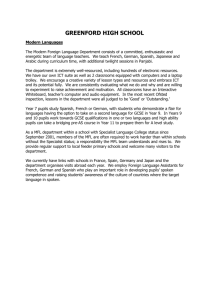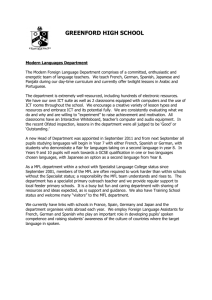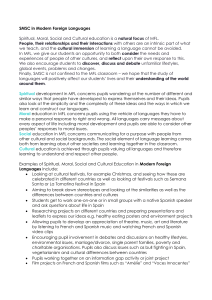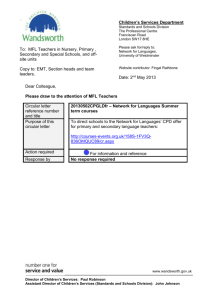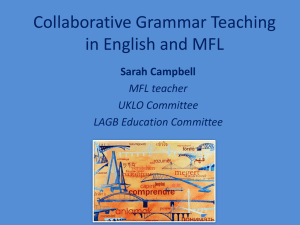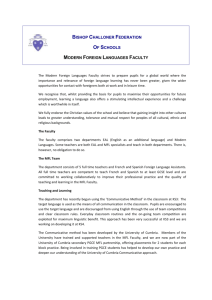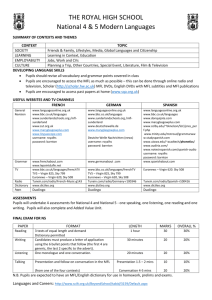Shawlands Primary School Modern Foreign Languages Policy The
advertisement
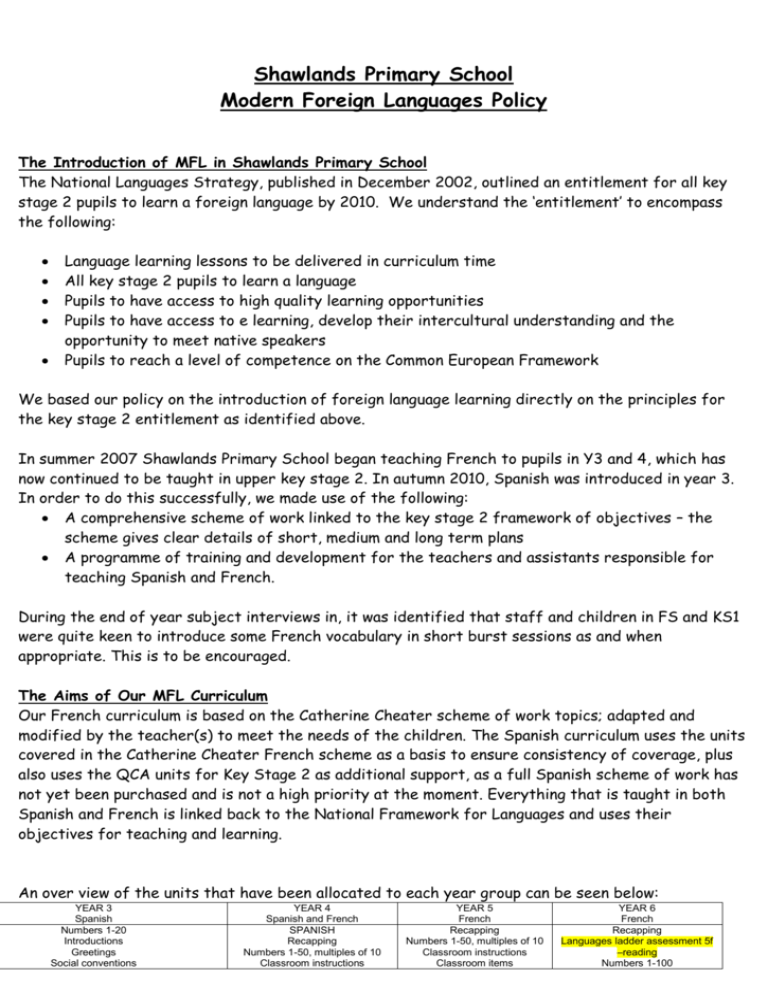
Shawlands Primary School Modern Foreign Languages Policy The Introduction of MFL in Shawlands Primary School The National Languages Strategy, published in December 2002, outlined an entitlement for all key stage 2 pupils to learn a foreign language by 2010. We understand the ‘entitlement’ to encompass the following: Language learning lessons to be delivered in curriculum time All key stage 2 pupils to learn a language Pupils to have access to high quality learning opportunities Pupils to have access to e learning, develop their intercultural understanding and the opportunity to meet native speakers Pupils to reach a level of competence on the Common European Framework We based our policy on the introduction of foreign language learning directly on the principles for the key stage 2 entitlement as identified above. In summer 2007 Shawlands Primary School began teaching French to pupils in Y3 and 4, which has now continued to be taught in upper key stage 2. In autumn 2010, Spanish was introduced in year 3. In order to do this successfully, we made use of the following: A comprehensive scheme of work linked to the key stage 2 framework of objectives – the scheme gives clear details of short, medium and long term plans A programme of training and development for the teachers and assistants responsible for teaching Spanish and French. During the end of year subject interviews in, it was identified that staff and children in FS and KS1 were quite keen to introduce some French vocabulary in short burst sessions as and when appropriate. This is to be encouraged. The Aims of Our MFL Curriculum Our French curriculum is based on the Catherine Cheater scheme of work topics; adapted and modified by the teacher(s) to meet the needs of the children. The Spanish curriculum uses the units covered in the Catherine Cheater French scheme as a basis to ensure consistency of coverage, plus also uses the QCA units for Key Stage 2 as additional support, as a full Spanish scheme of work has not yet been purchased and is not a high priority at the moment. Everything that is taught in both Spanish and French is linked back to the National Framework for Languages and uses their objectives for teaching and learning. An over view of the units that have been allocated to each year group can be seen below: YEAR 3 Spanish Numbers 1-20 Introductions Greetings Social conventions YEAR 4 Spanish and French SPANISH Recapping Numbers 1-50, multiples of 10 Classroom instructions YEAR 5 French Recapping Numbers 1-50, multiples of 10 Classroom instructions Classroom items YEAR 6 French Recapping Languages ladder assessment 5f –reading Numbers 1-100 Languages ladder assessment 3f – reading Ages, birthdays Days of the week Months of the year Dates Languages ladder assessment 3g – writingColoursAlphabet pronunciationFood, likes and dislikes, compare and contrastLanguages ladder assessment 3d – listening and speaking Family Descriptions Holidays – Christmas, Easter Classroom items Social conventions Body parts, descriptions Weather and countries, Languages ladder assessment 4c – speaking Map labelling of Spain. Spanish speaking countries. Languages ladder assessment 4h – writing Traditions, songs Languages ladder assessment 4g – listening and reading Additional – songs, finger rhymes Social conventions Body parts, descriptions Weather and countries Languages ladder assessment 4c – speaking Map labelling of France. French speaking countries. Languages ladder assessment 4h – writing Traditions, songs Languages ladder assessment 4g – listening and reading Additional – songs, finger rhymes Alphabet, spelling, dictionary work Animals, adverbial phrases, questions. Languages ladder assessment 5e – speaking Clothing, fashion Story reading, completing sentences, missing words Languages ladder assessment 5b – listening END OF YEAR - Languages ladder assessment 5i – writing Additional – songs, finger rhymes Additional – songs, finger rhymes FRENCH Numbers 1-20 Introductions and greetings Social conventions Languages ladder assessment 3f – reading Ages, birthdays Days of the week Months of the year Dates Languages ladder assessment 3g – writing Colours Alphabet - pronunciation Food, likes and dislikes, compare and contrast Languages ladder assessment 3d – listening and speaking Family Descriptions Holidays – Christmas, Easter Additional – songs, finger rhymes The aims and purposes of our curriculum are to: - Recognise and constantly be aware of the needs of each individual child according to ability, aptitude and individual learning style. - Provide children with a stimulating curriculum designed to enable all children to reach the highest standards of personal achievement. - Ensure teaching is purposeful, progressive and has continuity. - Ensure lessons are both practical and enjoyable. Delivering the Language in Curriculum Time MFL lessons tend to be between 30 – 45 minutes. In KS1, this would only be a 10 minute burst whenever the teacher deems it appropriate. The Catherine Cheater scheme of work outlines lessons divided into sections of approximately 15 minutes, although this is sometimes extended to 30 minutes, depending on the activity. Currently one class teacher, who is the MFL Coordinator, is responsible for delivering Spanish lessons to pupils in Y3 and Y4, and two members of the support staff teach pupils in Y4, 5 and 6. Currently The co-ordinator accesses the MFL training and cascades this to the support assistant. Any courses deemed appropriate for any staff members teaching MFL will be discussed and possibly attended depending on budget and staffing. All staff in school have undertaken familiarisation studies in the new Framework for Languages and related resources. The co-ordinator is aware of the objectives to be met and suitable ways to deliver them. Staff members know which pupils will enjoy performing to others in a foreign language and which pupils will need extra support with writing activities etc. Focus for lessons is mainly verbal, but some written elements are included as deemed appropriate. The co-ordinator monitors the learning being undertaken and the specific time slot for MFL learning, and adapts planning and delivery as needed. The class teacher can exploit links to other curriculum areas and be aware of the children’s learning in other areas. The class teacher can include language learning sessions as appropriate and is best placed to practise language with the children (e.g. Playing and singing a song while the children change for PE; practising number work; routines such as answering the register; preparing a class assembly) The teaching assistants are given time to plan. For the reasons outlined above, the MFL co-ordinator and support assistants take on the delivery of the foreign language during curriculum time, in line with activities and sequences taken from the scheme of work. Organisation of Our MFL Curriculum The table below outlines our intended implementation of the French curriculum. This ensures continuity for all the children who began to study a language last year. By the year 2010 MFL became statutory and was taught across the whole of KS2, and although it is no longer statutory we continue to ensure KS2 pupils benefit from French and Spanish tuition. The teaching of foreign languages has been extremely successful, with a very positive response from pupils, teachers and parents, and we have managed to establish links within the Barnsley community by the provision of extra classes through the Barnsley Wider Family Learning network. Assessing the Children’s Progress Assessment for individuals in MFL should be part of classroom activities, and may be completed in many ways; - Through the use of appropriate questioning of knowledge, skills and understanding by the teacher, TA and/or MFL co-ordinator. - Observations of the children working and the development process they are undertaking. - Listening to the children, discovering their understanding and knowledge of the topic. - Photographic evidence of work and children working. - Self-assessment by children - The end product. - Final assessment questions at the end of the topic to monitor progression. Using the languages ladder framework, 3 assessments have been allocated to each year group, which cover reading, writing, speaking and listening. They have been allocated to an appropriate unit of work and will be undertaken termly. Teachers will assess the children based on a higher, middle and lower ability scale. The data will be inputted into the assessment tracker which will follow the children through school and should help transition up to high school. We are producing ‘I can’ yearly self assessments for the children linked to the work they will have covered. A selection of the children’s work should be kept, serving as a record of their development. Work books will also provide evidence of the children’s development, although much of the work is practical. Planning and Progression of Learning Evidence of the children’s progression will be developed through their personal work books, display work and their knowledge. Children should be given the opportunities to learn through a balanced programme of activities, which clearly build on previous work and take account of previous achievement. We teach French using schemes of work, clearly linked to the KS2 framework for languages. Spanish is based on this scheme and the QCA and is also clearly linked to the framework. This means that progression is built into the scheme through the framework, with children progressing through the strands of Oracy, Literacy and Intercultural Understanding. E.g. Oracy O 3.1 Listen and respond to simple rhymes, stories and songs (Year 3) O 4.1 Memorise and present a short spoken text (Year 4) Literacy L 3.3 L 4.2 Experiment with the writing of simple words. (Year 3) Follow a short familiar text, listening and reading at the same time. (Year 4) Children’s achievements will be recognised through certificates awarded throughout the year, and through the use of stickers and stamps. Pupils to Have Access to E-learning and the Opportunity to Meet Native Speakers There are opportunities within the scheme of work for pupils to undertake research work using the internet. In addition we are hoping to provide the following opportunities: Making links with Spanish and French speaking schools through the eTwinning portal. Links with Barnsley Wider Family Learning team for extra classes. Possibly looking into having Foreign Language Assistants – whether this be from one of the High Schools or through Barnsley or the British Council The international dimension in Shawlands Primary School In Shawlands Primary School, the staff and governors are committed to promoting equal opportunities for all children. We aim to do this through providing the children with a range of high quality learning experiences that will enhance their learning and raise awareness of their national and international identity and by making the children aware of different countries, cultures and languages,. We have based our policy on the following aims: Encourage greater involvement in environmental issues Develop curiosity and respect about other cultures Promote the use of ICT and the study of languages in meaningful contexts Provide an added opportunity for the promotion of equal opportunities, racial and gender equality and citizenship Promote a greater understanding and celebrate the different nationalities represented in our school, and local and national communities. Respect and value different cultures and beliefs Make contact with children in different countries and living in different parts of the UK Objectives of integrating the international dimension To maintain the International School Award. Currently we have achieved the intermediate level award. To reflect on and audit the whole school curriculum to accommodate for the international dimension. To develop and fully exploit a variety of global learning partnerships. This will include activities such as link projects and interacting with visitors/native speakers To actively encourage the study of foreign languages for all our students by offering a range of appropriate language options To organise regular celebrations of our rich and diverse heritage Pupils to Have Access to High Quality Learning Opportunities In order to provide this, we need to ensure that: 1. The teacher is fully trained in delivering the appropriate schemes of work. All lessons in the scheme are linked to KS2 Framework objectives and ensure progression from Y3 to Y6. They provide a wealth of learning opportunities and focus on developing the pupils’ skills as language learners. 2. The teacher has the appropriate level of linguistic expertise. In order to develop teacher confidence and expertise in the language we have the following arrangements in place: KM currently supports the Support assistants working with Y4, 5 and 6 pupils. KM to enquire about linking with Holgate High School and Kingstone High school for support, resources and training. The head teacher is available for in-school support to work alongside staff to develop their confidence in their own language skills Teachers make use of the sound files which accompany the schemes of work Staff are to have the opportunity to attend appropriate courses. Display Displaying MFL should be used as an opportunity to celebrate the children’s progress and development of skills, also as a tool for learning. An MFL display wall has been set up on the year 3 and 4 corridor, which displays vocabulary and work completed by the children. Vocabulary should also be displayed around the classroom wherever possible and appropriate. Displays should offer the onlooker; - Information about the topic - Vocabulary - A selection of work from different abilities Display work should be double mounted. Differentiation As a school we aim to differentiate to the needs of the children; adapting work, learning situations and experimentation to the specific individual. It is essential that all children be provided for equally through the curriculum by: - Presenting work which is appropriately differentiated, through task, text, grouping, support, outcome and resources. Valuing contributions from different cultures. Providing content with is equally accessible and interesting to either gender. Special Needs We aim to make starting points, experiences and activities open ended for all children to work at their own level and have a valuable and positive learning experience. Less able children or children with physical difficulty are given the support and/or the adapted material they need. Gifted and Talented Children considered gifted and/or talented will be given tasks and experiences to develop their knowledge, skills and understanding at a higher level. It will be easier to identify these children once the assessment tracker is up and running. Transition Children from Shawlands Primary School will transfer to Horizon Community College, where a programme of MFL is in place. Resources The MFL resources for KS2 are stored in easily accessible areas for all classes and year groups to retrieve. Spanish resources are boxed and filed in Class 3, and there is an area outside Year 5 where French resources are kept. We also are looking into providing French and Spanish reading materials, particularly to support the gifted and talented children. In order to deliver the scheme of work and thereby the framework objectives, we needed to buy additional resources to support the teaching of MFL – particularly Spanish as it is a new subject. These were identified as essential in the scheme of work and included story books, nursery rhyme books, poetry books and CDs of authentic songs. We will continue to resource MFL as the need arises. Autumn 2012
